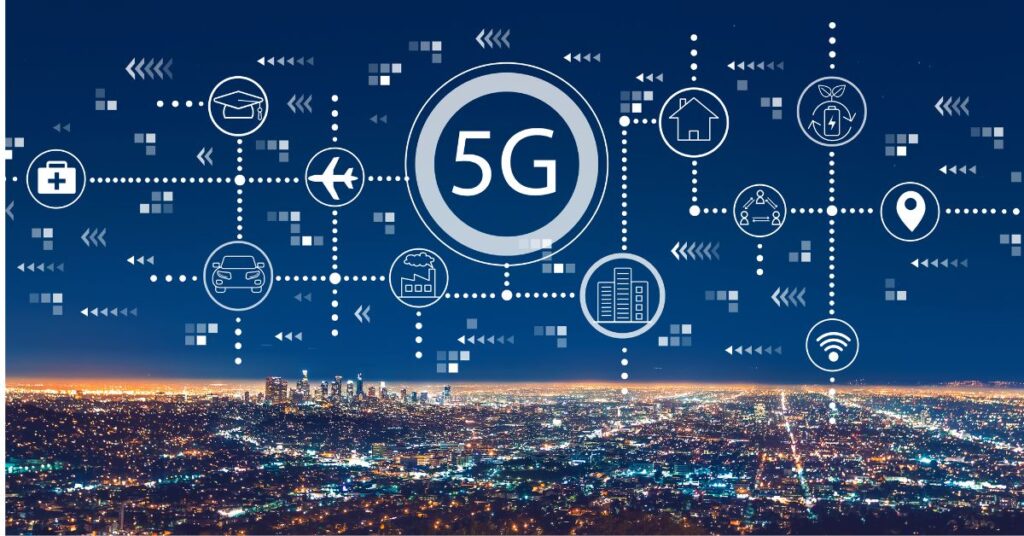5G technology is the latest advancement in wireless communication, offering ultra-fast internet speeds, low latency, and the ability to connect millions of devices at once. It is designed to enhance mobile networks, power smart cities, and support technologies like autonomous vehicles and the Internet of Things (IoT).
Imagine downloading movies in seconds or enjoying lag-free video calls—this is the power of 5G technology! More than just speed, it will revolutionize industries like healthcare, transportation, and entertainment, making our world more connected and efficient.
5G technology is the next big step in wireless communication. It builds on previous generations like 4G technology but offers much faster and more reliable connections. This means better internet for smartphones, smarter devices, and improved digital experiences for everyone. As we move forward, 5G technology will open the doors to innovations we never imagined before.
The Evolution of Internet Connectivity
Internet connectivity has come a long way, from slow dial-up connections to high-speed fiber optics. Each generation of wireless technology has improved speed, reliability, and efficiency. Now, 5G technology is leading the next revolution, offering ultra-fast internet, lower latency, and the ability to connect billions of devices seamlessly. This advancement is not just about faster downloads—it’s about enabling smart cities, autonomous vehicles, and real-time communication on a massive scale.
With 5G, industries like healthcare, transportation, and entertainment are experiencing groundbreaking innovations. Remote surgeries, self-driving cars, and immersive virtual experiences are becoming a reality, all thanks to this powerful network. As 5G technology continues to expand, it will redefine the way we work, communicate, and interact with the digital world, creating a more connected and intelligent future.
Understanding 5G Technology
5G technology is the latest upgrade in mobile networks, offering much faster internet speeds, lower delays, and the ability to connect many devices at once. It is designed to make everything from smartphones to smart cities work better and faster.
With 5G technology, you can download movies in seconds, enjoy smoother video calls, and experience improved online gaming. Beyond personal use, it will help industries like healthcare, transportation, and manufacturing become more efficient. Simply put, 5G is the future of communication, making our digital world faster and more connected than ever before.
Who Invented 5G Technology?
There isn’t a single person or company that invented 5G technology. Instead, it was developed by many technology companies, researchers, and organizations worldwide. Major telecom companies like Qualcomm, Nokia, Ericsson, and Huawei played a big role in creating and improving 5G networks.
International groups, such as the 3rd Generation Partnership Project (3GPP), helped set the global standards for 5G technology. Governments and telecom industries also worked together to bring this technology to life. 5G technology is the result of years of research and innovation, built on past generations of wireless networks like 3G and 4G, to create a faster and more connected future.
You may also like this: Cristiano Ronaldo: A Biography of Success and Dedication
Benefits of 5G Technology
5G technology brings faster internet speeds, allowing you to download movies, play games, and stream videos without delays. It also reduces lag, making video calls smoother and online experiences better. With stronger connections, more devices can work at the same time without slowing down.
Beyond personal use, 5G technology is transforming industries. It helps doctors perform remote surgeries, supports self-driving cars, and makes smart cities possible. Businesses can work more efficiently, and new innovations will continue to emerge. Simply put, 5G technology is making life faster, smarter, and more connected than ever before.
The 5G Network Architecture
The 5G network architecture is designed to make internet connections faster, more reliable, and efficient. It is built using advanced technologies like small cells, massive MIMO (multiple-input, multiple-output), and network slicing to handle more devices at once while reducing delays.
Unlike older networks, 5G uses both low, mid, and high-frequency bands to provide the best speed and coverage. It also supports cloud-based systems, making it easier for businesses and smart cities to function smoothly. With this improved structure, 5G technology can deliver ultra-fast speeds, power IoT devices, and revolutionize industries worldwide.
Challenges and Concerns of 5G Technology
While 5G technology offers many benefits, there are also challenges and concerns. One issue is the cost of building 5G infrastructure, as it requires new towers and equipment. This can be expensive and time-consuming for companies.
Another concern is privacy and security. As more devices connect to 5G networks, there’s a higher risk of data breaches and cyberattacks. Some people also worry about health effects due to the higher radio frequencies used by 5G. Despite these concerns, efforts are being made to address these challenges and ensure 5G can be used safely and effectively.
The Future of 5G Technology
The future of 5G technology looks exciting, with even faster speeds and more powerful connections ahead. As 5G networks continue to expand, we’ll see new innovations in smart cities, self-driving cars, and advanced healthcare. More devices will be able to connect seamlessly, creating a fully connected world.
In the coming years, 5G will help improve industries like education, entertainment, and manufacturing, making them more efficient and accessible. It will also play a key role in emerging technologies such as artificial intelligence (AI) and augmented reality (AR), bringing new possibilities to everyday life. Simply put, the future of 5G is all about creating a smarter, faster, and more connected world.
Conclusion
In conclusion, 5G technology is transforming the way we connect and interact with the digital world. With its lightning-fast speeds, low latency, and ability to support millions of devices, 5G is opening doors to new innovations across industries. From smart cities to healthcare, transportation, and beyond, the potential of 5G is vast and exciting.
As this technology continues to grow, it will reshape our daily lives and create countless opportunities for the future. While there are challenges to address, the benefits of 5G will undoubtedly revolutionize connectivity and lead to a more connected and efficient world.
FAQs
What is 5G technology?
5G is the fifth generation of mobile network technology, offering faster speeds, lower latency, and the ability to connect more devices at once compared to previous generations like 4G.
How fast is 5G compared to 4G?
5G is significantly faster than 4G. While 4G can offer speeds up to 1Gbps, 5G can reach speeds up to 20Gbps, making downloads and streaming much quicker and smoother.
What industries will benefit from 5G?
Many industries, including healthcare, transportation, entertainment, and manufacturing, will benefit from 5G. For example, it will enable remote surgeries, self-driving cars, and smarter cities.
Will 5G replace 4G?
5G will complement 4G, not completely replace it. In some areas, 4G will still be used, especially in places where 5G networks aren’t fully rolled out yet.
What are the main challenges of 5G?
Some challenges include the high cost of building 5G infrastructure, privacy and security concerns, and potential health concerns related to radio frequencies used by 5G.
How will 5G improve everyday life?
5G will improve internet speeds for activities like video streaming and gaming. It will also make devices like smartphones, smart homes, and IoT gadgets work faster and more efficiently.







